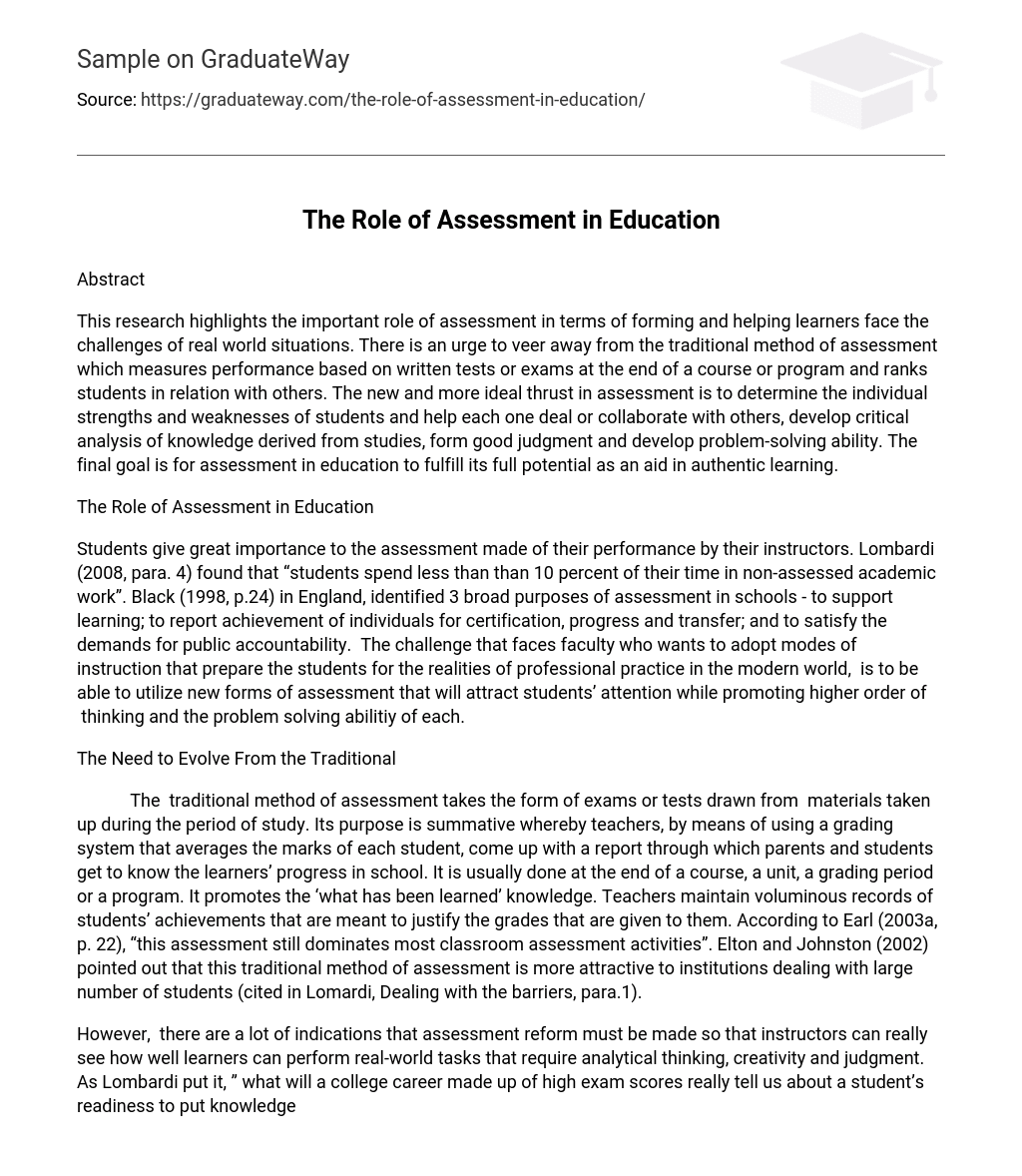Abstract
This research highlights the important role of assessment in terms of forming and helping learners face the challenges of real world situations. There is an urge to veer away from the traditional method of assessment which measures performance based on written tests or exams at the end of a course or program and ranks students in relation with others. The new and more ideal thrust in assessment is to determine the individual strengths and weaknesses of students and help each one deal or collaborate with others, develop critical analysis of knowledge derived from studies, form good judgment and develop problem-solving ability. The final goal is for assessment in education to fulfill its full potential as an aid in authentic learning.
The Role of Assessment in Education
Students give great importance to the assessment made of their performance by their instructors. Lombardi (2008, para. 4) found that “students spend less than than 10 percent of their time in non-assessed academic work”. Black (1998, p.24) in England, identified 3 broad purposes of assessment in schools – to support learning; to report achievement of individuals for certification, progress and transfer; and to satisfy the demands for public accountability. The challenge that faces faculty who wants to adopt modes of instruction that prepare the students for the realities of professional practice in the modern world, is to be able to utilize new forms of assessment that will attract students’ attention while promoting higher order of thinking and the problem solving abilitiy of each.
The Need to Evolve From the Traditional
The traditional method of assessment takes the form of exams or tests drawn from materials taken up during the period of study. Its purpose is summative whereby teachers, by means of using a grading system that averages the marks of each student, come up with a report through which parents and students get to know the learners’ progress in school. It is usually done at the end of a course, a unit, a grading period or a program. It promotes the ‘what has been learned’ knowledge. Teachers maintain voluminous records of students’ achievements that are meant to justify the grades that are given to them. According to Earl (2003a, p. 22), “this assessment still dominates most classroom assessment activities”. Elton and Johnston (2002) pointed out that this traditional method of assessment is more attractive to institutions dealing with large number of students (cited in Lomardi, Dealing with the barriers, para.1).
However, there are a lot of indications that assessment reform must be made so that instructors can really see how well learners can perform real-world tasks that require analytical thinking, creativity and judgment. As Lombardi put it, ” what will a college career made up of high exam scores really tell us about a student’s readiness to put knowledge into practice in creative ways?” Thus, instructors face the challenge of applying assessment methods that will not only answer what is learned but how learning can be used by students to be able to adapt realistically to actual life situations.
New assessment techniques have been designed that challenge students to think analytically, formulate judgments in given situations and learn to collaborate with others in group works. Lombardi presented some techniques that can serve to meet the purpose of authentic assessment such as the rubrics design, peer assessment requiring classmates to evaluate one another, research portfolios, and assignments that involve significant group work that lead students closer to real world practice than assignments that require students to work independently.
If assessment is going to fulfill its promise as an aid to learning, it is time to
rethink its purpose and shift the balance away from assessment of learning after the fact and utilize the assessment process as a vehicle for learning for teachers and students about the
progress and problems embedded in new learning (Earl, 2003b, Assessment purpose is paramount, para. 2) . Assessing the judgment, thinking skill, problem solving ability and success in collaboration with others by an individual is more difficult and time consuming than the traditional method of assessing knowledge that can be quantified through written exams and marked essays. However, the former is a more reliable basis of real and authentic learning.
Conclusion
The role of assessment, therefore, plays a significant role in helping learners attain their full potential by properly diagnosing individual strengths and weaknesses. Authentic assessment makes the indivdual ready to face the challenges in actual life situations by being more competitive. The world is evolving at a fast pace and graduates must be able to gear themselves to the rapid economic changes and information-intensive scenes that require technical skills, problem solving abilities and personal adaptation.
References
Black, P. (1998). Testing: Friend or foe? Theory and practice of assessment and
testing. London, Falmer Press.
Earl, L. M. (2003a). Assessment as learning: Using classroom assessment to maximize student learning. Thousand Oaks: Corwin Press.
Earl. L.M. (2003b). Classroom assessment for deep understanding: Shifting from assessment of learning to assessment for learning and assessment as Learning. Retrieved on June 9, 2009 from http://www.npbs.ca/06-elements/deep-understanding-earl.pdf
Elton, L. and Johnston, B. (2002), Assessment in universities: A critical review of research (York: LTSN Generic Centre)
Lombardi, M. M. (2008). Making the grade: The role of assessment in authentic learning. Retrieved June 9, 2009 from http://net.educause.edu/ir/library/pdf/ELI3019.pdf





